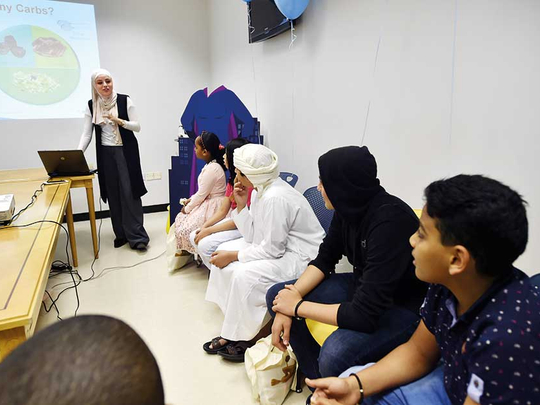
Abu Dhabi: Rana Al Dhahabi had raised five children, yet it was with her sixth that she faced the biggest shock.
At the tender age of nine, Yousuf Al Heera was diagnosed with diabetes and Al Dhahabi found herself at a complete loss.
“For a week, it felt like we had time for nothing else but to measure calories and sugar levels and worry. I was in such shock that I could not even cry,” the Emirati hypnotherapist and mother of six told Gulf News.
For three years now, the mother has helped her growing son manage Type 1 diabetes, including helping him deal with its psychological toll. She says that diabetes management is still an uphill climb, even though the disease is getting increasingly more common in the UAE.
“Yousuf, who weighed 60kg at the time, felt extremely lonely. I myself was always working to help him deal with his food and activity levels, but what he apparently really needed was to connect with more young people dealing with the same struggle,” Al Dhahabi said.
The now 12-year-old recently attended a camping trip for young diabetic patients organised by the public health care facility, Mafraq Hospital.
“He came back and told me he wanted to go on such a retreat every month. For the first time, it seemed as if he had found people who helped make the struggle seem normal. It changed his perspective, and made him more determined to better manage his disease,” the mother said.
“The pity is that the camping trip happens only once every year. If we had more such opportunities, it would help young patients cope better and make it easier for their parents too,” she added.
Yousuf has Type 1 diabetes, an incurable autoimmune disease in which the immune system suddenly destroys the insulin-producing beta cells in the pancreas. Without enough insulin, blood sugar levels become unnaturally high, and if they are not managed, other organs can become permanently damaged.
Al Dhahabi says she has faced a steep learning curve.
“I felt like I spent the first year completely absorbed in his care, and my life become wrapped up in the numbers: blood sugar, calorie content and insulin dosage,” Al Dhahabi remembers.
When he was first diagnosed with diabetes, Yousuf’s blood sugar was a whopping 400 milligrams per decilitre, whereas normal blood sugar should be below 140 milligrams per decilitre.
“I would keep on checking and every time I found it to be high, I would worry again because I knew how diabetes could compromise his cardiac health, vision and mobility,” Al Dhahabi said.
To engage her son in more physical activity that he could manage, the mother started taking him to Yas Waterworld.
“It has gradually gotten better; Yousuf is better at managing his calorie intake, and the insulin pumps that deliver the required insulin before his meals help a lot,” she said.
The mother cautioned other parents against ignoring the telltale signs of diabetes.
“Often, you cannot control whether or not your child develops diabetes, especially if it’s Type 1 diabetes. But you can help them manage it if you know. I know of an acquaintance who kept brushing away her 15-year-old’s complaints of thirst and chest pain. The child eventually died,” Al Dhahabi said.
She remembers how Yousuf suddenly began passing urine a lot before his diagnosis, and wetting his bed more frequently. He also complained of a burning sensation in his chest, which is when Al Dhahabi and her husband took him to the clinic.
“Knowing the problem helped us take adequate measures, even though I felt there was tremendous pressure on us as parents. In fact, I even insisted that his school nurse check his blood sugar twice a day in the beginning so that I would know he was fine,” the mother said.












